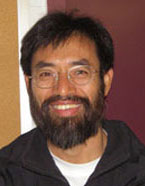Alexander Kirdyanov et Marina Bryukhanova
25 octobre de 10h à 12h
Salle Tilleul – INRA centre de Nancy, Champenoux
_____________________________________________
Nous accueillons le 25 octobre Alexander Kirdyanov et Marina Bryukhanova du groupe de E. Vaganov (Sukachev Institute of Forests, Krasnoyarsk). E. Vaganov est un chercheur réputé sur la formation du bois et pour son livre de 2006.
Le vendredi 25 octobre ils donneront un séminaire soutenu par le projet WADe dans le Labex ARBRE (mais qui dépasse largement l’analyse de cernes).
Résumé Alexander Kirdyanov:
Dendro-science in Siberia. Case studies from the Tree-Ring Structure Lab (Institute of Forest, Krasnoyarsk, Russia)
Tree-rings were shown to provide comprehensive information on the environmental changes and physiology of tree functioning. The Laboratory of Tree-Ring Structure at the Sukachev Institute of Forest, Krasnoyarsk Russia is focused on extracting and interpreting this information with the goals to understand the impact of environment on tree growth and forest productivity. A short overview of some recent and current studies will be provided to show the main topics of interest and the potential of the Lab: transect studies, use of multi-proxy approach (tree-ring cell structure, density and isotope composition), studies on permafrost, etc. Examples will vary on both spatial (from one stand to continental) and temporal scale (seasonal growth with the resolution of 3-7 days to multi-millennia dendroclimatic reconstructions).
Résumé Marina Bryukhanova:
Growth of trees on permafrost: habitat driven response to climate
Global change is expected to alter boreal forest conditions with far reaching consequences for tree growth in these ecosystems. Within this study we aimed at determining which limiting factors control tree-growth on permafrost under different site conditions.
A tree-ring multi-proxy characterisation of mature Larix gmelinii (Rupr.) Rupr. from a continuous permafrost zone of Siberia (Russia, 64°18′ N, 100°11′ E) was used to identify the physiological principle of responses related to the plant-soil system. Tree-ring width (1975-2009), carbon and oxygen stable isotopes, and xylem structural characteristics (2000-2009) indicated that an increased depth of the soil active layer favors a better exploitation of the available resources.
_____________________________________________
Le projet WADE
Adaptation physiologique et fonctionnelle des structures et propriétés du bois à l’ouverture du couvert
Contexte — La variabilité de la qualité du bois est utilisée en dendrochronologie pour marquer les événements passés. Une meilleure compréhension de cette plasticité du bois demande de nouvelles approches, car les réponses de l’arbre superposent de nombreux processus. Les modèles usuels fondés sur l’observation passée ne sont pas fiables dans le contexte de changements environnementaux rapides et intenses.
Objectifs — Le but de WADE est de rénover le cadre de modélisation et d’analyse de la plasticité des structures et propriétés du bois. WADE s’appuie sur les questions posées par l’acclimatation à l’ouverture du couvert, qui représente une perturbation à la fois fréquente et complexe.
Approches— WADE s’appuie sur une approche multi-échelle de la structure et des propriétés du bois, depuis l’arbre entier jusqu’à la composition chimique et l’ultra-structure pariétale. WADE met en œuvre un large éventail de techniques de la dendro-écologie, de la biophysique et de la chimie du bois. Le cadre conceptuel explicitera les critères de choix des traits du bois et la signification fonctionnelle des variations observées. WADE utilise les avancées récentes de l’écophysiologie et de la biomécanique pour étudier comment les arbres réagissent aux changements du microclimat lumineux et mécanique après ouverture.
Responsable scientifique : Meriem Fournier (UMR 1092 Laboratoire d’Etude des Ressources FOrêt Bois)




